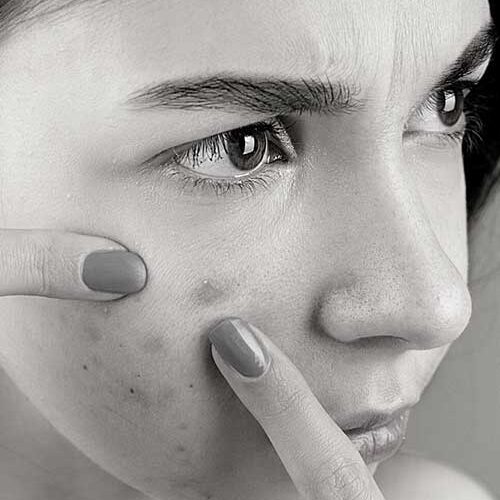Unveiling Acne Breakouts: Causes and Solutions

Acne breakouts are a common cosmetic concern that can affect individuals of all ages. These pesky blemishes tend to develop when hair follicles become filled with oil, dead skin cells, and bacteria. Hormonal fluctuations can stimulate an increase in oil production, contributing to acne development. Stress, diet, and certain medications can also exacerbate acne symptoms.
There are diverse treatments available to manage and treat acne. Over-the-counter products containing benzoyl peroxide or salicylic acid work well to clear blockages. Topical retinoids, prescribed by a dermatologist, can reduce inflammation. In more problematic instances, oral medications like antibiotics or birth control pills may be recommended.
- It's essential to maintain a consistent skincare routine that includes gentle washing and applying lotion
- Refrain from touching your face frequently, as this can introduce microbes
- Seek professional advice for personalized treatment recommendations and guidance
Dealing With Chin Breakouts
Breakouts around your chin can be frustrating, but they don't always signal a big problem. While acne itself isn't harmful, it can be socially uncomfortable. Chin acne frequently linked to hormonal fluctuations these, mostly around your menstrual cycle. Stress and diet also play a role skin health.
- Some tips for potential causes of chin acne:
- It often involves your menstrual cycle, pregnancy, or simply reaching menopause
- Dietary factors: worsen acne. Try to reduce sugary drinks, processed foods, and dairy.
Try if you are concerned about persistent chin acne, consider seeing a dermatologist. They can help figure out what's causing it and recommend the ideal treatment options for you.
Cheek Breakout SOS: Finding Relief from Acne acne
Ugh, cheek breakouts. They can be so annoying and painful! However, they're a common problem, especially when you're dealing with stress or hormonal changes. The good news is that there are plenty of things you can do to soothe your skin and get rid of those pesky blemishes.
First, it's important to wash your face twice a day with a gentle cleanser. Avoid harsh soaps or scrubs, as these can irritate your skin and make breakouts worse. Next, look for products that contain salicylic acid or benzoyl peroxide. These ingredients fight acne by reducing bacteria and unclogging pores. You can also try applying a warm compress to the affected area to help calm inflammation.
If your breakouts are severe or don't respond to home treatment, it's important to see a dermatologist. They can recommend prescription medications or other treatments that may be more effective. In the meantime, be patient and gentle to your skin. It will eventually clear up!
Grasping Acne: Types and Triggers
Acne is a common skin condition that affects countless of people worldwide. It often appears during adolescence due to hormonal shifts, but can also occur in adults. Understanding the various types and potential triggers of acne is essential for successful treatment.
There are several types of acne, spanning from mild zits to severe infected lesions. Whiteheads are characterized by tiny, pearly spots that form under the skin's surface. External pimples, on the other hand, have a blackened opening due to air contact of the sebum inside.
Various factors can influence acne breakouts. Fluctuations in hormones are a common cause. Stress can also aggravate existing acne. Certain acne breakouts treatment medications may in addition induce breakouts.
Diet plays a role, with some studies showing that sugary drinks may contribute acne. Family history also play a part in acne susceptibility.
Maintaining good skin hygiene is important for managing acne breakouts. This includes washing your face twice daily with a gentle cleanser. Avoid over-washing, as this can irritate the skin.
The Truth About Acne Breakouts: Myths vs. Facts
Acne is a common skin condition/problem/issue that can affect people of all ages. While it often appears during puberty, it can also persist into adulthood. There are many myths/rumors/beliefs about acne, some of which can be harmful to your skin health/well-being/care. It's important to understand the truth about acne breakouts so you can effectively/successfully/properly manage your skin/complexion/face.
- One/A common/A widespread myth is that acne/breakouts/zits are caused by eating too much chocolate/candy/sugar. While sugary foods can trigger/worsen/aggravate acne in some people, they aren't the sole cause/reason/culprit.
- Another/A popular/Often-repeated myth is that popping/squeezing/bursting pimples helps them heal faster/go away quicker/clear up sooner. In reality, this can worsen/spread/increase inflammation and lead to scarring/infection/complications.
- Contrary/Unlike/Opposite to popular belief, acne isn't always a sign of poor hygiene/lack of cleanliness/dirty skin. Even people who are very diligent about their skincare can experience/may develop/still get acne.
It's best to consult with/talk to/see a dermatologist for personalized advice on how to treat/manage/control your acne. They can help you identify/determine/figure out the underlying causes/reasons/factors of your acne and recommend the most effective treatment/plan/options for your skin type.
Conquering Acne: A Guide to Managing Acne
Dealing with pimples can be a frustrating experience. However, there are methods you can take to reduce these pesky skin problems. First by creating a good skincare routine This includes cleansing your face regularly with a soft cleanser.
- Use this up with a cream that's suited for your skin type
- Avoid touching your face frequently, as this can spread bacteria.
, In addition basic tips, consider using OTC acne treatments. These commonly contain ingredients like benzoyl peroxide that can aid in reducing acne.
If, if your acne is severe, it's crucial to talk to a dermatologist. They can provide you with more specific treatment options.